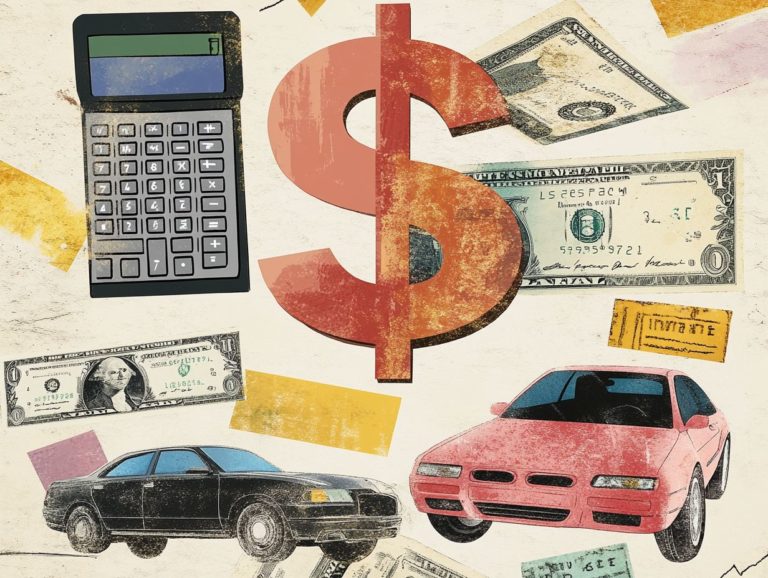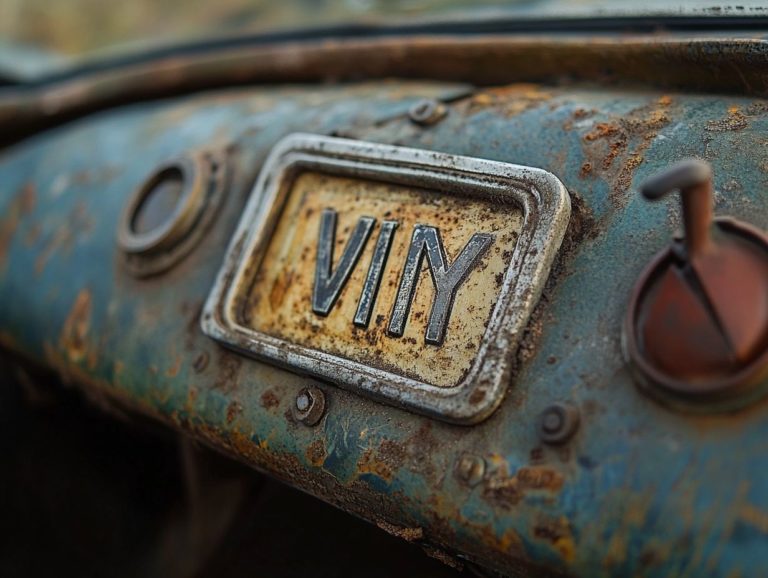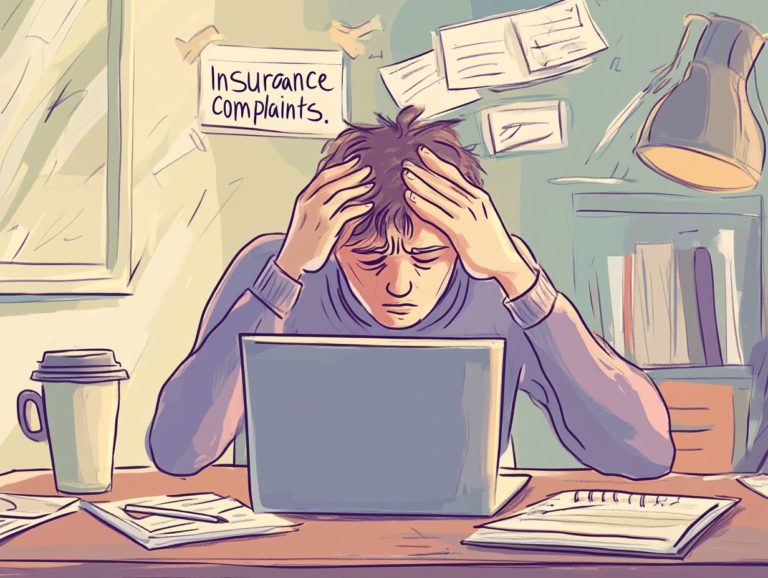5 Things Your Auto Insurance Policy Must Have
Ready to dive into the essentials of auto insurance? Navigating the world of auto insurance may seem daunting, but grasping the essential components of your policy is vital for safeguarding both yourself and your vehicle.
This article distills the five key types of coverage that every driver should contemplate:
- Liability coverage
- Collision coverage
- Comprehensive coverage
- Personal injury protection
- Uninsured/underinsured motorist coverage
You ll also find insights into legal requirements, additional coverage options, and strategies for determining the appropriate level of protection. We ll even highlight common pitfalls to steer clear of.
Whether you re a new driver or revisiting your existing policy, this guide is designed to empower you with the knowledge needed to make informed decisions, ensuring you re well-equipped for the road ahead.
Contents
- Key Takeaways:
- 1. Liability Coverage
- 2. Collision Coverage
- 3. Comprehensive Coverage
- 4. Personal Injury Protection (PIP)
- 5. Uninsured/Underinsured Motorist Coverage
- What Is the Minimum Auto Insurance Coverage Required by Law?
- What Other Types of Coverage Can Be Added to an Auto Insurance Policy?
- How Can a Person Determine the Right Amount of Coverage for Their Policy?
- What Are Some Factors That Affect Auto Insurance Rates?
- What Happens If a Person Does Not Have Adequate Coverage in an Accident?
- What Are Some Common Mistakes People Make When Choosing Auto Insurance?
- Frequently Asked Questions
Key Takeaways:
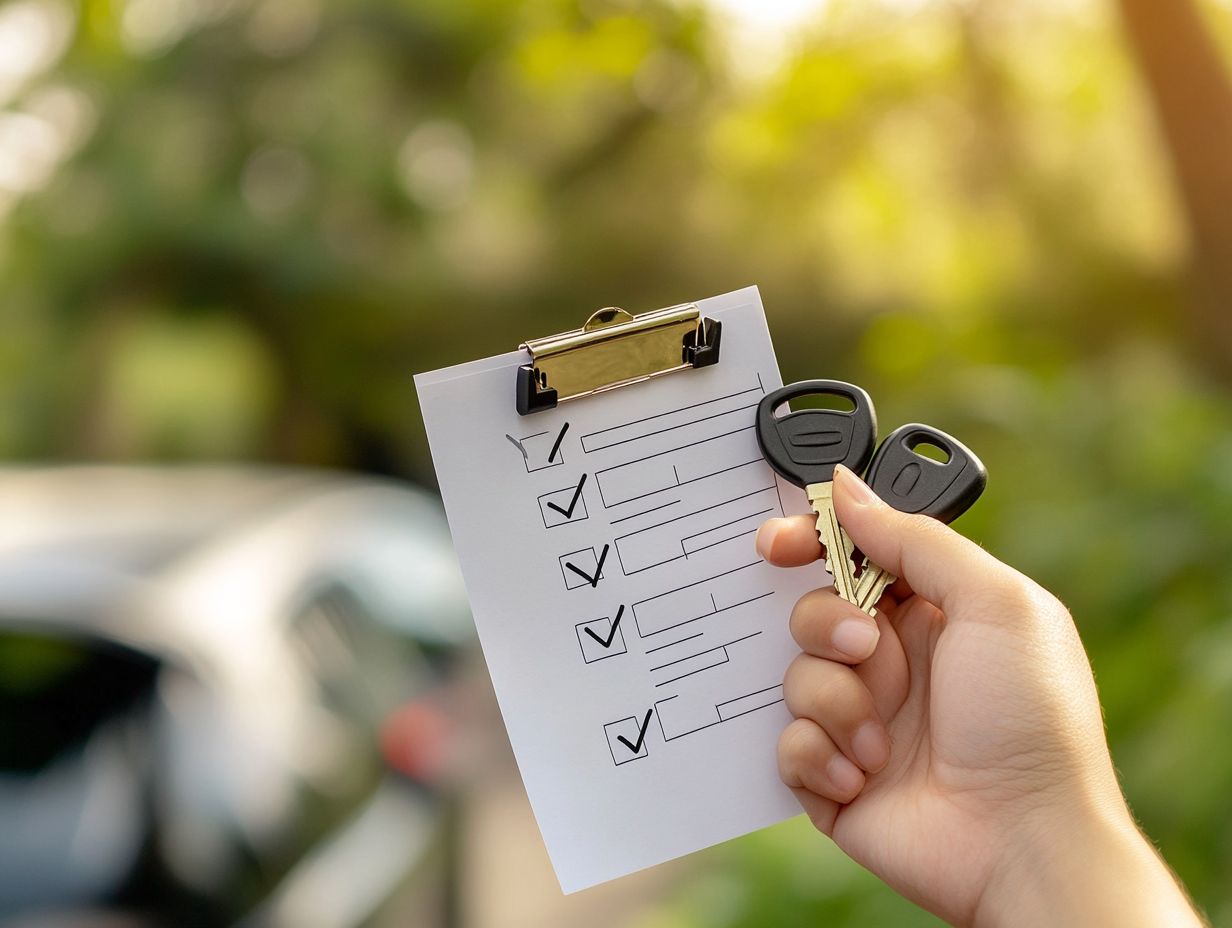
- Liability coverage is essential for protecting against damages and injuries caused to others in an accident!
- Collision coverage can help cover the cost of repairs to your own vehicle in the event of an accident!
- Comprehensive coverage provides protection against non-collision events, such as theft or natural disasters!
1. Liability Coverage
Liability coverage is a cornerstone of car insurance. It protects you from financial losses caused by damages or injuries to others in an accident.
This type of insurance is not just a smart choice; it s essential for following financial responsibility laws that differ from state to state. It ensures you can manage bodily injury and property damage claims that may emerge from your actions on the road.
The liability limits set by your policy determine the maximum amount your insurer will cover for such damages. Therefore, it is vital for you to grasp your coverage options to adequately safeguard your assets and financial well-being.
Bodily injury liability covers medical expenses, lost wages, and pain and suffering for the injured parties. Meanwhile, property damage liability takes care of the repair or replacement of someone else’s vehicle or property. Understanding the nuances between these types of coverage is crucial, especially since states impose varying minimum requirements for both, influencing how you assess your overall financial responsibility.
Your driving history can significantly affect your liability insurance rates. Safer drivers often qualify for lower monthly payments. Talk to insurance brokers for personalized recommendations. They can help you find the best protection while following state laws.
2. Collision Coverage
Collision coverage is a type of auto insurance designed to help you pay for repairs or replacement of your vehicle after an accident, no matter who s at fault. This means you have financial support when you need it most.
When considering collision coverage, it s essential to look at it alongside comprehensive insurance, which covers non-collision incidents like theft, vandalism, or natural disasters. Several factors can influence your monthly payment costs, including the make and model of your vehicle, your driving history, and the amount you pay out of pocket before insurance kicks in.
Opting for a higher deductible typically results in lower monthly payments, but it also means you ll face more out-of-pocket expenses when it s time to file a claim.
Collision coverage is invaluable in various situations, such as multi-car accidents or when you accidentally hit a stationary object. It alleviates the financial strain of repairs and helps you get back on the road more quickly.
Take control of your auto insurance today! Review your policy and consider these 5 tips for understanding your insurance policy to ensure you have the coverage you need.
3. Comprehensive Coverage
Comprehensive coverage is your safety net on the road! It is an important part of a robust car insurance policy, safeguarding you against an array of risks, including theft, vandalism, natural disasters, and accidents that don t involve a collision.
This type of protection ensures that if a deer unexpectedly darts into the road or severe weather wreaks havoc on your parked vehicle, you won t be left grappling with the financial fallout alone. Unlike collision coverage, which is limited to damages from accidents involving another vehicle or object, comprehensive coverage casts a wider safety net. By providing financial assistance for various unforeseen events, it helps protect your investment in your vehicle.
To make informed financial decisions, obtaining precise insurance quotes is essential. This gives you the power to compare different coverage options and select the one that aligns perfectly with your needs.
4. Personal Injury Protection (PIP)
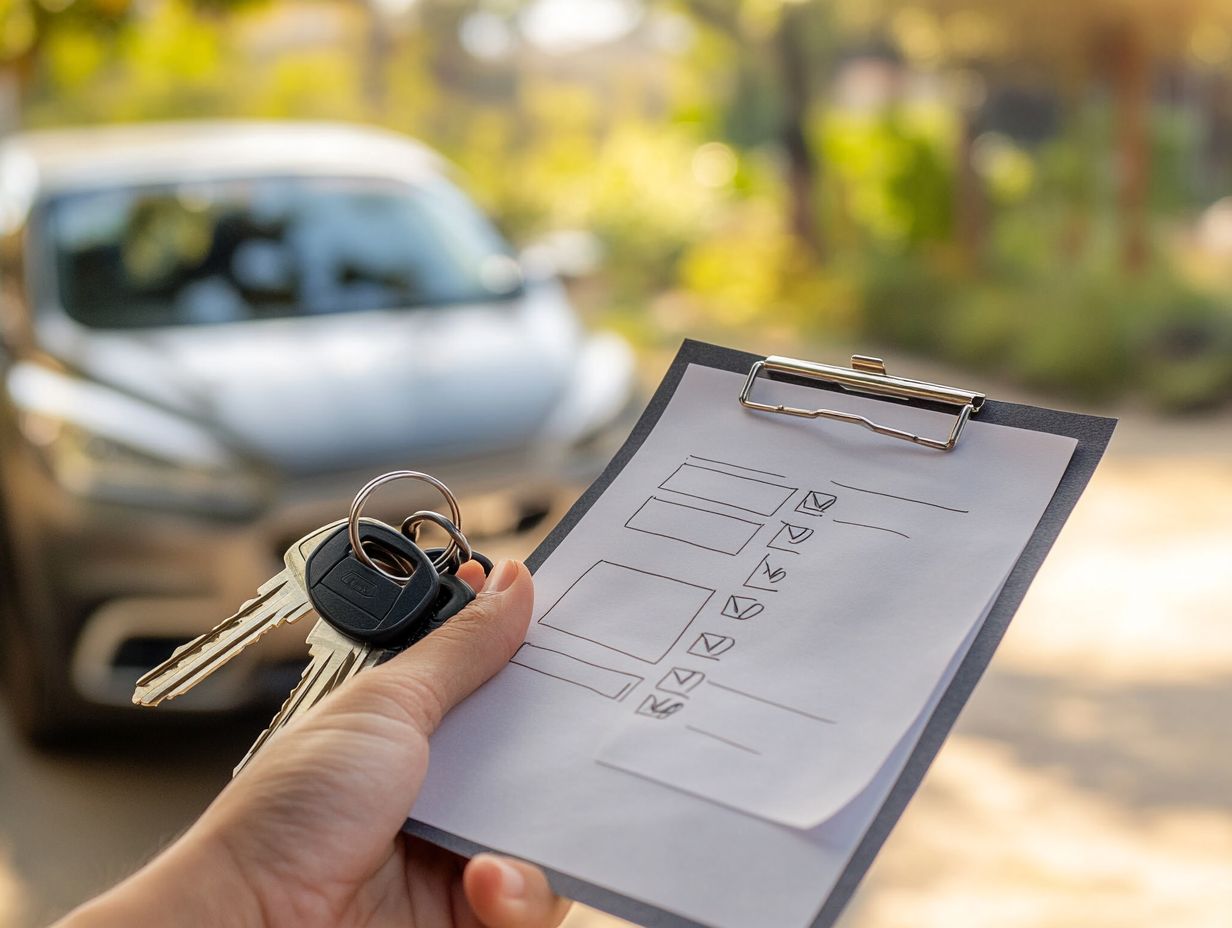
Personal Injury Protection (PIP) is an important part of many car insurance policies. It offers coverage for medical expenses and, in certain cases, lost wages for you and your passengers if you re involved in an accident regardless of fault.
This coverage includes medical payments. It may also cover costs for recovery and, in some situations, even expenses for essential services like childcare or household chores that become difficult due to your injuries.
The specifics of what PIP covers can vary significantly depending on state laws. Some states may require PIP to be included in your insurance policy while others offer it as an optional add-on, influencing both your benefits and requirements.
For example, certain states may provide higher limits for medical expenses, whereas others might focus more on lost wages. Understanding these variations is crucial, as they help fulfill your financial responsibilities following an accident, ensuring that both your immediate and long-term needs are well taken care of.
5. Uninsured/Underinsured Motorist Coverage
Uninsured and underinsured motorist coverage is an essential component of your car insurance that offers vital protection in the unfortunate event of an accident involving a driver who is either inadequately insured or completely uninsured. This means the other driver doesn’t have enough insurance to cover the damages.
This coverage ensures that you won’t be left to shoulder crippling financial burdens due to someone else’s negligence. It effectively fills potential gaps in liability limits, protecting you from costly medical bills, vehicle repairs, and lost wages that could arise if you find yourself in an accident with an underinsured driver.
Understanding your state’s requirements regarding this coverage is crucial, as regulations can vary significantly. Each state mandates different minimum coverage levels, and being aware of these can directly impact the effectiveness of your insurance policy.
Arming yourself with this knowledge gives you the power to make informed decisions, ensuring that you are adequately protected on the road.
What Is the Minimum Auto Insurance Coverage Required by Law?
The minimum auto insurance coverage mandated by law varies from state to state. It is designed to ensure that you uphold a fundamental level of financial responsibility while driving. This protects not only you but also others sharing the road.
In many states, these required coverage limits specify amounts for bodily injury per person and per accident, as well as for property damage. While some states may only require modest limits, others impose higher thresholds due to rising medical costs and vehicle repair expenses.
Failing to meet these requirements can lead to significant fines, license suspension, or even legal troubles following an accident. Therefore, it s essential for you to familiarize yourself with your state s regulations.
Consider reaching out to insurance professionals who can help you navigate the complex landscape of laws and tailor policies that ensure you remain compliant and adequately protected.
What Other Types of Coverage Can Be Added to an Auto Insurance Policy?
Along with standard coverages, you can choose from many additional options, including unique features of Washington auto insurance. This enhances your auto insurance policy.
This allows you to customize your coverage to align perfectly with your unique needs, providing you with robust financial protection.
For example, rental car coverage can be a game-changer if you rely on your vehicle for daily commutes. Enjoy peace of mind knowing you have a reliable substitute while your car is in the shop for repairs.
Another invaluable option is gap insurance. This covers the difference between what you owe on your car and what it s worth if it gets totaled. It shields you from financial setbacks when your vehicle is totaled, and the insurance payout falls short of covering your remaining loan balance.
Consider also the benefits of umbrella policies. These offer an extra layer of liability protection, safeguarding your assets beyond the limits of standard policies. This is particularly important if you possess significant assets or anticipate facing larger claims down the road.
By thoughtfully considering these additional coverages, you can build a comprehensive safety net that s finely tuned to your lifestyle and circumstances.
How Can a Person Determine the Right Amount of Coverage for Their Policy?

Determining the right amount of coverage for your auto insurance policy is essential. It demands thoughtful consideration of your financial situation, insurance needs, and the potential risks you face on the road. For more insights, check out these top tips for understanding your auto insurance policy.
To begin, evaluate your financial responsibility by reflecting on your assets and income. This ensures you have sufficient coverage to guard against possible liabilities.
Understanding your state’s requirements is equally important. These regulations dictate minimum coverage levels. This knowledge will help you tailor a policy that aligns with both legal standards and your personal needs.
Engaging with an insurance broker can be incredibly beneficial. They can offer customized quotes that take your unique circumstances into account.
Reviewing your driving history is a smart move. A record of accidents or violations can significantly impact your coverage amounts and premium costs, guiding you toward informed decisions about the protection you truly need.
What Are Some Factors That Affect Auto Insurance Rates?
Several factors significantly influence your auto insurance rates. These include your driving history, the type and extent of coverage you choose, and the policies of different insurance companies.
If you maintain a clean driving record, you ll likely enjoy lower premiums, as insurers see you as a lower risk.
On the flip side, a history marked by accidents or traffic violations can drive your rates up, signaling to insurers a greater chance of future claims.
The coverage you select also plays a pivotal role in determining costs. For example, opting for comprehensive or collision coverage typically raises your premiums, whereas a basic liability policy tends to be more budget-friendly.
Different insurers evaluate these factors in their own unique ways. This can affect the final rate you receive. This makes it essential for you to compare various options thoroughly before settling on a decision.
What Happens If a Person Does Not Have Adequate Coverage in an Accident?
Failing to maintain adequate coverage in an accident can have severe financial repercussions. This could lead to liability claims that exceed your policy limits and leave you with significant out-of-pocket expenses.
If you re found liable for damages or injuries resulting from an accident, the financial fallout can escalate quickly. Lawsuits could come knocking, and without sufficient insurance, you might face hefty legal fees.
Without adequate coverage, you risk losing personal assets to satisfy judgments. When medical expenses or property damage far exceed your insurance payouts, funding necessary repairs or caring for injured parties can become a significant struggle.
Don t wait! Keeping your liability limits appropriate shields you against potentially overwhelming costs. This proactive approach allows you to enjoy peace of mind, confident that your financial security is more firmly established should an unfortunate incident arise.
What Are Some Common Mistakes People Make When Choosing Auto Insurance?
Choosing auto insurance can be confusing. It’s easy to stumble into common pitfalls that might leave you with coverage gaps, which means not having enough protection or less financial security than you deserve in the event of an accident. To avoid this, be sure to consider 5 types of coverage to compare for your vehicle.
Recognizing these missteps early is crucial. Underestimating your coverage needs based on your vehicle’s value or your daily driving habits can lead to serious issues. Ignoring the importance of liability limits can place you at risk of significant financial strain should a serious incident occur.
Conduct thorough research to tackle these challenges. Comparing multiple insurance quotes ensures that your policy provides adequate coverage tailored to your unique circumstances. Consulting with an insurance professional can also be incredibly beneficial. They offer valuable insights that help clarify your options and deepen your understanding of the various coverage levels available in the market.
Frequently Asked Questions

What are the 5 things that my auto insurance policy must have?
Your auto insurance policy must include:
- Liability coverage
- Collision coverage
- Comprehensive coverage
- Uninsured/underinsured motorist coverage
- Personal injury protection
How does liability coverage protect me?
Liability coverage protects you financially if you are found at fault in an accident. It covers expenses for injuries to others and damages to their property.
What does collision coverage cover?
Collision coverage pays for repairs to your vehicle if you are in an accident, regardless of who is at fault. It may also cover the cost of replacing your vehicle if it is totaled.
What is comprehensive coverage?
Comprehensive coverage pays for damage to your vehicle from non-collision events. This includes theft, vandalism, or natural disasters. It may also cover rental car costs while your vehicle is being repaired.
Why is uninsured/underinsured motorist coverage important?
Uninsured/underinsured motorist coverage protects you if you are in an accident with someone who lacks insurance or whose insurance is insufficient. It also covers hit-and-run accidents.
What is personal injury protection?
Personal injury protection covers your medical expenses and lost wages if you are injured in an accident, regardless of who is at fault. It may also cover services you cannot perform yourself, such as housekeeping or childcare.

